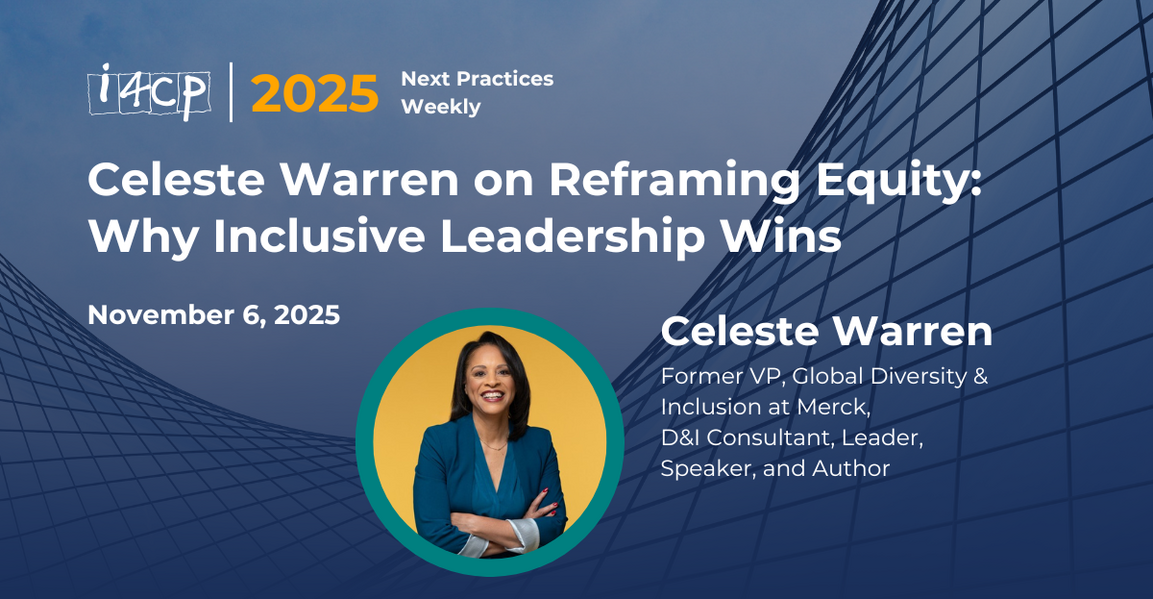Total Rewards COVID-19 Action Recording with Asurion's Ben Merrill & Peloton's Michael Gettlin - 7/30/20
As the coronavirus pandemic continues to cause unprecedented impact to business, employers, and employees, human capital leaders continue to face both short- and long-term challenges. Since March, i4cp has held a weekly series of calls specifically for Total Rewards leaders to discuss problems and share ideas regarding health and well-being benefits, compensation considerations, and more. Each week, nearly one hundred executives join these calls to hear from their community and access the latest research from i4cp's Coronavirus Employer Resource Center.
This week's featured guest is Ben Merrill, VP HR at Asurion & Michael Gettlin, VP Total Rewards at Peloton.
In response to the ongoing coronavirus outbreak and its unprecedented impact to business and employers, i4cp holds a weekly series of standing calls to help Total Rewards leaders navigate this unpredictable time.
On i4cp’s July 30, 2020 Total Rewards Leader COVID-19 Response Series call the primary topic was Employee Assistance Programs (EAPs). Our special guest was i4cp Total Rewards board member Ben Merrill, Vice President of Human Resources at Asurion, a privately held company based in Nashville, Tennessee, that provides insurance for smartphones, tablets, consumer electronics, appliances, etc., and has around 20,000 employees globally and 16,000 in the US.
Some highlights:
- As with so many aspects of work life, we have been hearing that EAPs have been impacted by the pandemic. When asked to what extent has the coronavirus pandemic impacted the utilization of your employee assistance program, half of call participants said it has to a moderate extent and another third said it has to a significant extent.
- At Asurion, they started to redesign their EAPs several years ago, based on both external and internal data and considerations in areas such as mental health and other needs, to go beyond having standard solutions such as a 1-800 number. Leadership was quickly on board noting that this was the right thing for the company to do, in addition to the arguments from an ROI standpoint regarding improved attrition, productivity, etc. The goal was to provide a broad solution that would address both acute individual needs (e.g., emergencies such as natural disasters, the pandemic, etc.) as well as more chronic needs (e.g., stress, behavioral health, family issues, mindfulness, etc.) in order to provide an overall wellness platform. The branding has shifted to be much more about holistic well-being rather than a check-the-box, emergency-help focused offering. The new program leverages Lyra as primary provider and was launched just recently, during the COVID-19 pandemic, so was very timely and well-received.
- Organizations should work to de-stigmatize the use of EAP and wellness services. For instance, people generally don’t like to share any hint of emotional or financial instability, and this can inhibit the use of employer-provided services that can really help people when they most need it. One way to combat this issue is to ask for volunteer employees, especially leaders, to share their stories (via video or otherwise) of times when they relied on the services, and what to expect in doing so. Creating a montage of such stories can help normalize and encourage use for those seeking help.
- How can employees relieve stress while working from home? Some organizations are declaring some days (often specific Fridays) as additional company holidays this year. Participant Allan Brown from Electronic Arts shared the following other ideas:
- Creating Teams/Slack channels for parents
- Providing emergency backup care (e.g., from LifeCare or care.com)
- Offering additional time off
- Increasing the stipend for work from home expense
- Providing ergonomic support through a consultant
In addition to this recording, please see these resources:
- The i4cp Coronavirus Employer Resource Center - new research and next practices to help address the COVID-19 pandemic




